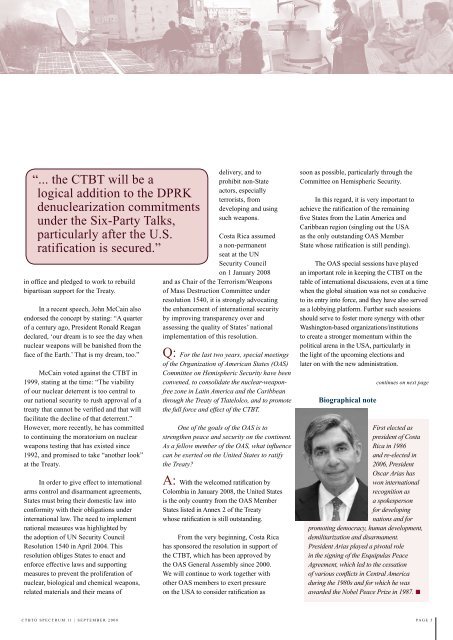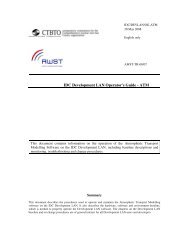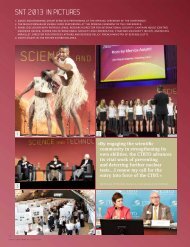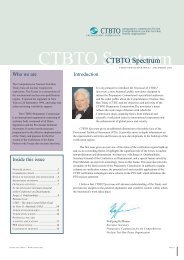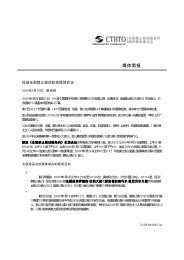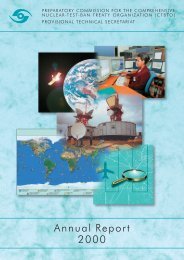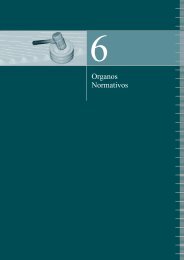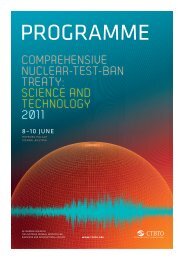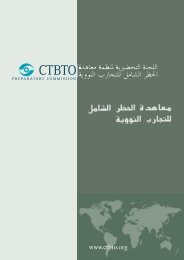In the spotlightThe Comprehensive Nuclear-Test-Ban Treaty (CTBT):The Way ForwardPresident Oscar Arias of Costa Rica presents his views on the CTBTQ: Since the Comprehensive Nuclear-Test-Ban Treaty (CTBT) opened forsignature in 1996, Costa Rica has beenunwavering in its political and technicalsupport. It is coordinating the Conferenceon Facilitating the Entry into Force of theComprehensive Nuclear-Test-Ban Treaty(Article XIV Conference) until 2009. Italso chaired the Preparatory Commissionfor the Comprehensive Nuclear-Test-BanTreaty Organization (CTBTO) in 2007 andthe current Director of the InternationalMonitoring System Division of the CTBTOis a Costa Rican national.of Korea, Egypt, India, Indonesia, Iran,Israel, Pakistan, and the United States.The probable exception here isIndonesia, which is likely to respond tointensified lobbying efforts from like-mindedStates and ratify in the near future.In the case of India and Pakistan, itis important to work out a creative dealwhereby the lack of trust between the twocountries can be overcome, by proposing thatsignature/ratification be a joint action by bothStates. It is very important for the internationalRegarding the Democratic People’sRepublic of Korea (DPRK), as it dependslargely on China, it is foreseeable that it willfollow suit after the Chinese ratification. Inaddition, the CTBT will be a logical additionto the DPRK denuclearization commitmentsunder the Six-Party Talks, particularlyafter the U.S. ratification is secured.Which brings us now to the United States.Q: How important do youconsider U.S. leadership in theCTBT ratification process to be?In view of this backgroundand of Costa Rica’s commitment toglobal nuclear disarmament, whatsteps do you consider necessaryover the next few years to ensurethe Treaty’s entry into force?A: Costa Rica reiteratedits strong support for theCTBT when it assumed,together with Austria, theco-chairmanship of the fifthArticle XIV Conference heldin Vienna from 17 to 18 September 2007.The Conference’s final declarationcalled for measures to promote the entryinto force of the CTBT. Therefore, renewedefforts must be made to call on outstandingStates to sign and ratify the Treaty.While continuing to take advantageof bilateral occasions as well as multilateralfora for this purpose, I believe that newconcerted efforts and strategies must bedefined for the nine outstanding countries.Let us review the list of States whosesignature/ratification is still outstanding,and who need to ratify the Treaty for itto enter into force (Annex 2 countries):China, the Democratic People’s Republic“It is necessary that theUnited States resumesits leadership role andcommitment to the CTBTas one of the proponentsof the Treaty.”community to be attentive to developments ofthe U.S.-India deal, as it has a direct bearingon the CTBT and the norm against nucleartesting. It is regrettable that the documentsrelating to civil nuclear cooperation with Indiawhich have so far been agreed upon, includingthe safeguards agreement with the IAEA, havefailed to place conditions on India to maintainits test moratorium and have not mentionedthe importance of CTBT signature/ratification.Regarding the outstanding MiddleEast countries, the strategy will not beeffective unless it is integrated into thelarger peace efforts for the region.China has openly indicated thatit is looking towards the United Statesbefore moving to ratification.A: It is necessary that the UnitedStates resumes its leadership role andcommitment to the CTBT as one of theproponents of the Treaty. The upcomingelections provide an excellentopportunity to start new lobbyingefforts within the policy-makingapparatus in the new administration.The two major presidentialcandidates have already declaredthat they would make major changesto the national security and foreignpolicies carried out by the George W.Bush administration over the last sevenyears. Although the United States has notconducted a nuclear test explosion since1992, the Bush administration has notput the Treaty forward for a new vote onratification to the Senate.Barack Obama has been clear inhis support of the bipartisan group ofsenior and former government officialswho have called for moving toward a“world free of nuclear weapons. He haspromised: “As president, I will take thelead to work for a world in which theroles and risks of nuclear weapons canbe reduced and ultimately eliminated.”Furthermore, he has promised to makethe CTBT a priority of his first termpa g e C T B T O S p e c t r u m 1 1 | S e p t e m b e r 2 0 0 8
“... the CTBT will be alogical addition to the DPRKdenuclearization commitmentsunder the Six-Party Talks,particularly after the U.S.ratification is secured.”in office and pledged to work to rebuildbipartisan support for the Treaty.In a recent speech, John McCain alsoendorsed the concept by stating: “A quarterof a century ago, President Ronald Reagandeclared, ‘our dream is to see the day whennuclear weapons will be banished from theface of the Earth.’ That is my dream, too.”McCain voted against the CTBT in1999, stating at the time: “The viabilityof our nuclear deterrent is too central toour national security to rush approval of atreaty that cannot be verified and that willfacilitate the decline of that deterrent.”However, more recently, he has committedto continuing the moratorium on nuclearweapons testing that has existed since1992, and promised to take “another look”at the Treaty.In order to give effect to internationalarms control and disarmament agreements,States must bring their domestic law intoconformity with their obligations underinternational law. The need to implementnational measures was highlighted bythe adoption of UN Security CouncilResolution 1540 in April 2004. Thisresolution obliges States to enact andenforce effective laws and supportingmeasures to prevent the proliferation ofnuclear, biological and chemical weapons,related materials and their means ofdelivery, and toprohibit non-Stateactors, especiallyterrorists, fromdeveloping and usingsuch weapons.Costa Rica assumeda non-permanentseat at the UNSecurity Councilon 1 January 2008and as Chair of the Terrorism/Weaponsof Mass Destruction Committee underresolution 1540, it is strongly advocatingthe enhancement of international securityby improving transparency over andassessing the quality of States’ nationalimplementation of this resolution.Q: For the last two years, special meetingsof the Organization of American States (OAS)Committee on Hemispheric Security have beenconvened, to consolidate the nuclear-weaponfreezone in Latin America and the Caribbeanthrough the Treaty of Tlatelolco, and to promotethe full force and effect of the CTBT.One of the goals of the OAS is tostrengthen peace and security on the continent.As a fellow member of the OAS, what influencecan be exerted on the United States to ratifythe Treaty?A: With the welcomed ratification byColombia in January 2008, the United Statesis the only country from the OAS MemberStates listed in Annex 2 of the Treatywhose ratification is still outstanding.From the very beginning, Costa Ricahas sponsored the resolution in support ofthe CTBT, which has been approved bythe OAS General Assembly since 2000.We will continue to work together withother OAS members to exert pressureon the USA to consider ratification assoon as possible, particularly through theCommittee on Hemispheric Security.In this regard, it is very important toachieve the ratification of the remainingfive States from the Latin America andCaribbean region (singling out the USAas the only outstanding OAS MemberState whose ratification is still pending).The OAS special sessions have playedan important role in keeping the CTBT on thetable of international discussions, even at a timewhen the global situation was not so conduciveto its entry into force, and they have also servedas a lobbying platform. Further such sessionsshould serve to foster more synergy with otherWashington-based organizations/institutionsto create a stronger momentum within thepolitical arena in the USA, particularly inthe light of the upcoming elections andlater on with the new administration.Biographical notecontinues on next pageFirst elected aspresident of CostaRica in 1986and re-elected in2006, PresidentOscar Arias haswon internationalrecognition asa spokespersonfor developingnations and forpromoting democracy, human development,demilitarization and disarmament.President Arias played a pivotal rolein the signing of the Esquipulas PeaceAgreement, which led to the cessationof various conflicts in Central Americaduring the 1980s and for which he wasawarded the Nobel Peace Prize in 1987. ■C T B T O S p e c t r u m 1 1 | S e p t e m b e r 2 0 0 8Pa g e


